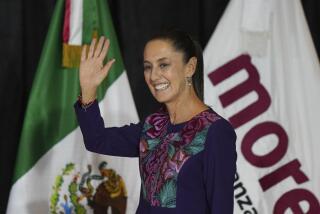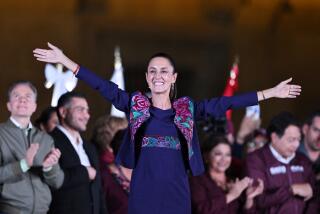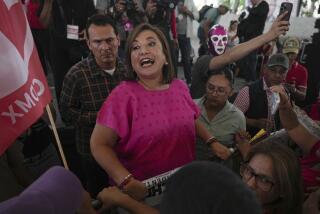Famous, Near-Famous Among Observers : Monitoring: The humble rub shoulders with the highbrows as Nicaragua votes.
MANAGUA, Nicaragua — At breakfast, Bianca Jagger introduced herself to Jim Wright. At noon, Jimmy Carter stepped out of the elevator and was hustled through the lobby by a phalanx of Secret Service agents. And by mid-afternoon, the place was so thick with congressmen and senators that a quorum would not have been too far-fetched.
Managua’s Inter-Continental Hotel on Sunday was the place to see and be seen. With hundreds of international observers flooding the country to witness Nicaragua’s national elections, the humble rubbed shoulders with the highbrow--all in the name of democracy and honest voting.
“I didn’t vote because I wasn’t here in time to register,” said the Nicaraguan-born Jagger, ex-wife of the Rolling Stones’ Mick Jagger. Wright was representing the Southwest Voter Registration Project, a Hispanic voters’ rights group from the United States.
Buzzing above the celebrity fray was a leading triumvirate of election observers: Joao Baena Soares, secretary general of the Organization of American States; former U.S. Atty. Gen. Elliot L. Richardson, leader of a U.N. team of observers, and Carter, head of a group of congressmen and former heads of state.
Nicaragua’s elections, the first since 1984, are by most accounts the most observed elections in the history of a sovereign nation. Between 2,000 and 3,000 observers fanned out across the country before the balloting. They were expected to visit more than half of the country’s 4,394 polling stations during the course of the day and watch the vote being counted at about 600 of them.
The largest observer teams were assembled by the OAS, which sent 430, and the United Nations, which sent 240. The OAS and U.N. missions had been in Nicaragua for months in a monitoring effort that began with voter registration. But Carter’s group, which included a dozen U.S. senators and congressmen along with several former Latin American presidents, was expected to issue its election assessment first.
Most of the observers came at the invitation of Nicaragua’s Sandinista government, which needs them to legitimize its assertions that the elections have been fair.
Some voters, at least, appeared glad to have the observers around. At one polling station, a man approached an American reporter and asked, “Who’s that guy?” gesturing at a bushy-browed fellow. Informed that it was Wright, the man went up to the former Speaker of the U.S. House of Representatives to register his complaint.
“Frankly, our presence complicates everything,” said Robert Pastor, Carter’s adviser on Latin America. “It slows the voting down with all the press and everything.”
But Ariosto Rivas, a 34-year-old government worker, wasn’t complaining. “We need them because if they weren’t here and there was fraud, no one would ever know.”
More to Read
Sign up for Essential California
The most important California stories and recommendations in your inbox every morning.
You may occasionally receive promotional content from the Los Angeles Times.










